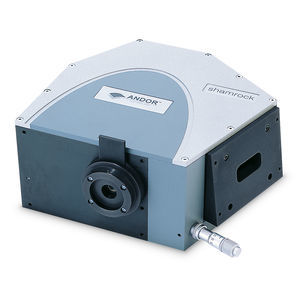
- Laboratory
- Physico-chemical analysis
- Czerny-Turner spectrometer
- Andor Technology PLC
Czerny-Turner spectroscope Kymera 328i seriesopticalRamanNIR
Add to favorites
Compare this product
Characteristics
- Type
- Raman, optical, Czerny-Turner, UV, NIR
- Applications
- for research
- Wavelength
0.04 nm, 0.2 nm
Description
dor’s range of highly versatile spectrographs provide high resolution, high throughput, high modularity, ease of use from the UV to the NIR and SWIR, from macro- to nano-scale, with fluxes down to single photon and time-resolution down to nanosecond. Andor’s spectrograph technology is based on Czerny-Turner, Echelle or Transmission optical designs.
Spectrograph features include:
High modularity
Intelligent motorisation
TruRes™ – Highest spectral resolution
Adaptive FocusTM technology (patented)
Ideal for both or Physical and Life science
Czerny-Turner, Echelle & Transmission Optical Spectrographs
Andor’s spectrograph family is based on Czerny-Turner, Echelle or Transmission optical designs, and offers a range of highly configurable or highly specialised platforms to best suit your experimental requirements.
328 mm focal length
F/4.1 aperture
Adaptive Focus (Patented)
Dual inputs and outputs
Raman
Raman is a molecular spectroscopy technique that can provides chemical and structural fingerprint information for a wide range of samples, including for example nanomaterials, polymers, powders, liquids or cells/tissues. Key Raman techniques include:
Spontaneous and stimulated
Surface Enhanced Raman Spectroscopy (SERS)
Surface Offset Raman Spectroscopy (SORS)
Tip-Enhanced Raman Spectroscopy (TERS)
Coherent Anti-Stokes Raman Scattering (CARS)
Luminescence
Luminescence spectroscopy is used for a large variety of applications including for example the study of metal complexes, organic LEDs (OLEDs), quantum dots, cell dynamics, stand-off detection of chemical compounds (e.g. explosives) or scintillators properties measurement. Key techniques include:
Catalogs
No catalogs are available for this product.
See all of Andor Technology PLC ‘s catalogsRelated Searches
- Analysis software
- Microscopy
- Compound microscope
- Laboratory microscope
- Tabletop microscope
- Control software
- Laboratory software
- Oxford Instruments spectrometer
- Oxford Instruments CMOS camera
- Oxford Instruments camera with USB port
- Hospital software
- LED illuminator
- Acquisition software
- Scan software
- Zoom microscope
- Biological microscope
- Medical camera
- Benchtop spectroscope
- Oxford Instruments microscope camera
- Research microscope
*Prices are pre-tax. They exclude delivery charges and customs duties and do not include additional charges for installation or activation options. Prices are indicative only and may vary by country, with changes to the cost of raw materials and exchange rates.






